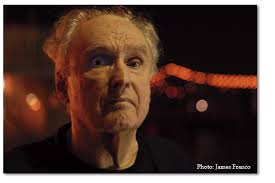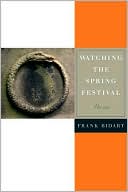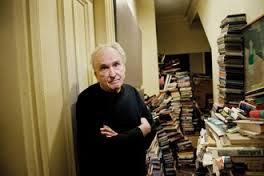The vexing question raised by Frank Bidart’s poetry: Is the language we speak to each other, in negotiating our days, just a stream of euphemisms? Is the language of poetry any better? As Forrest Gander says here in “The Art of Inhabiting the Body,” “Although the poems protest, they do not seek to shatter familiar syntactical rhythms for the purpose of revolutionizing language. They are more reconciliatory than that.” The recurring amazement of Bidart’s work is the simultaneity of a violation incorporated in the materials and narrative form, and a reconciliation with and in the reader.
 The achievement over time has been a custodial defense of language. As impersonal as Bidart’s work may be, I have always felt that he is working to defend me in particular. But the operation isn’t pretty. He appeals to my active potential by deflating my static integrity. Bidart’s generosity is identical to the opportunities he gives us to experience that desired potential: to penetrate and integrate. As Richard Howard wrote in his persuasive introduction to Golden State, included here, “the self must become one with its unacknowledged obsession, that there is only the one life, not other lives.”
The achievement over time has been a custodial defense of language. As impersonal as Bidart’s work may be, I have always felt that he is working to defend me in particular. But the operation isn’t pretty. He appeals to my active potential by deflating my static integrity. Bidart’s generosity is identical to the opportunities he gives us to experience that desired potential: to penetrate and integrate. As Richard Howard wrote in his persuasive introduction to Golden State, included here, “the self must become one with its unacknowledged obsession, that there is only the one life, not other lives.”
 In “An Interview with Frank Bidart,” Danielle Allen asks, “What would you say to someone who is trying to solve the problem of writing extreme poetry in the current context where a more understated or ironic approach does dominate magazines?” The answer may be found in Bidart’s poetry, but it’s not one some young poets want to hear. Bidart may have dispensed with irony and metaphor, but he has never given up on dramatic context, discrete ideas, precision of phrase, and trust in the act of provoking language to yield more deeply felt utterance. Bidart responds, “The point is that you experience in your life issues that the culture pretends are solved but that you know in your gut are not solved. They are not solved by whatever fashions are reigning in the academy.”
In “An Interview with Frank Bidart,” Danielle Allen asks, “What would you say to someone who is trying to solve the problem of writing extreme poetry in the current context where a more understated or ironic approach does dominate magazines?” The answer may be found in Bidart’s poetry, but it’s not one some young poets want to hear. Bidart may have dispensed with irony and metaphor, but he has never given up on dramatic context, discrete ideas, precision of phrase, and trust in the act of provoking language to yield more deeply felt utterance. Bidart responds, “The point is that you experience in your life issues that the culture pretends are solved but that you know in your gut are not solved. They are not solved by whatever fashions are reigning in the academy.”
As a book of instructive and inspiring perspectives, On Frank Bidart has a great deal to offer. Langdon Hammer’s “Frank Bidart and the Tone of Contemporary Poetry” is an engrossing discussion of tone in general; he asserts that Bidart has rejected a certain flatness in contemporary poetry, “a general shift of register, a mutation that can be felt as a loss of depth and dimension.” Here is Hammer’s definition of tone: “A term for the manner of relationship the writer constructs with his reader. Tone is therefore the key to ‘intention,’ the writer’s aim.” Hammer’s piece puts Bidart, Ashbery, and Frederic Jameson’s “waning of affect” in helpful perspective – and points to the impressive and stubborn originality of Bidart in opposition to the pressure of trends.
Dan Chiasson’s “Presence: Frank Bidart” offers this key insight: “The only chance a poet has to transcend the conventions by which the self is assembled and represented is to acknowledge those conventions; since the self is for Bidart necessarily and in every case a dramatic character, the more ‘dramatic’ the presentation of self, the clearer that self and its attendant dilemmas will be … Bidart’s model for speech, then, is self-conscious performance.” In Bidart’s work, the narrative voices of isolated characters may stagger or grope or even attempt to sprint down the jagged page, but he avoids a detachment of those voices from the psychological, linguistic, social, and historical references of our age. Everything calls out to our understanding; there is a confidence that we will understand. Although syntax is processed through and warped by the tense and often tortured mind of his speakers, the effect is clarity.
 There are illuminating comments by Bidart’s contemporaries: Alan Williamson, Louise Glück, Anne Winters, Alan Shapiro. Robert Pinsky’s contribution, a selection from “The Discursive Aspect of Poetry,” hits upon this intriguing question about “Golden State”: “Does a craving for some absolute glory or pleasure, beyond the apparent possibilities and compromises of actual life, constitute something infantile and trivial, or something irresistibly heroic, demanding loyalty?” Although the response “seems to lean away from such careful compromise and toward the unreasonable, indecently hungry shapes of desire,” the question not only lingers but has been put to work productively by Bidart.
There are illuminating comments by Bidart’s contemporaries: Alan Williamson, Louise Glück, Anne Winters, Alan Shapiro. Robert Pinsky’s contribution, a selection from “The Discursive Aspect of Poetry,” hits upon this intriguing question about “Golden State”: “Does a craving for some absolute glory or pleasure, beyond the apparent possibilities and compromises of actual life, constitute something infantile and trivial, or something irresistibly heroic, demanding loyalty?” Although the response “seems to lean away from such careful compromise and toward the unreasonable, indecently hungry shapes of desire,” the question not only lingers but has been put to work productively by Bidart.
In her 1991 review of In the Western Night, Helen Vendler writes, “The poet can try over a lifetime to expand [the imagination’s] reach, to multiply the number of points it goes after, but the essential direction of its pressure may be as genetically determined as the instructions for the spider’s web … What [the imagination] seeks is the counterpressure to what threatens it.” Genetically engineered to push back, Bidart is matching the incessant pressure exerted on him (and us) to the emerging stages of his related masterworks, most recently in “The Third Hour of the Night.”
Vendler also says, “No poem can now exist for Bidart which does not question its own moral position-taking. To see oneself as a historically conditioned person of questionable motives and at the same time give lyric pathos to that skeptical vision is a hard task.” For those of us who struggle to find viable, integrative ways of speaking to our personal pasts, history, and culture, Frank Bidart is a poet from whom we can learn much.
[Published by the University of Michigan Press on March 8, 2007, 216 pages, $25.95 paper]